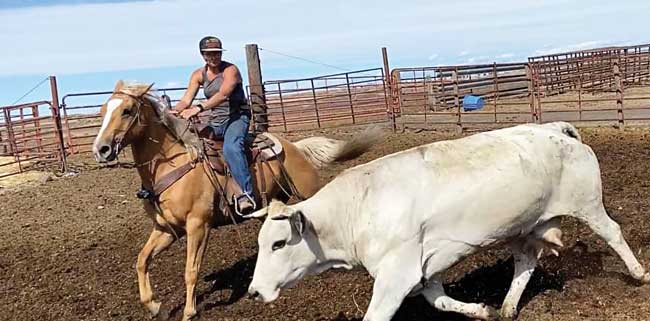Cecelia Kostal looks like a cowgirl – with her high boots, slim jeans, and long sleeved shirt that covers a tank top for when the sun allows breathing room. This is her daily dress. In fact, it’s more than likely her Sunday go to meetin’ garb, too. It’s just who she is. She’s top hand on a local cattle ranch and does a hard day’s work, every day. The first thing in the morning is getting up at 4:30 to prep for getting the kids up at 5:30. After organizing, cooking breakfast and getting them off to school, she goes out on the ranch and feeds cows that are in corrals for fattening. They call those daily chores “day thugging” getting down and dirty in and out of the corrals. With bales of hay dumped into feeders, she’ll pause for a few minutes to run an eye over them all to make sure no one is sick or injured. It takes a practiced eye to spot the subtle signs of cattle just being off enough to appear slightly different from the others, potentially getting sick.
She is a herdsman, fence builder, feeder, truck driver, mechanic, herd health worker, secretary and sounding board for the boss. And she’s ready all the time to climb in the saddle and get down to business. And right now that would be moving some cows to be worked in the corrals. She’ll ride in with a dozen head from a close-in pasture. Today three are being culled (sent off to market). She’ll find them by identifying markings and breed, reading their ear tag numbers, and on horseback cut them out of the bunch and move them into the loading area where she’ll back up the truck and trailer, load then drive them to their destination. Once unloaded it’ll be a drive back to the ranch for lunch. She works cattle alone some of the time, which she likes. Not always an easy task but cattle don’t trust people they don’t see regularly. It’s often easier to work them alone to get them cooperating. She says cows are definitely not stupid, they just need time to process what’s going on and decide what you want, before they will do it (or not).
Riding since age five, she’s put more than 30 years in the saddle. Her parents weren’t ranchers but had land for their kids’ horses. She spent about 20 years working sale barns learning to read cattle and being paid to ride horses through the sale barn. The money helped with college expenses. She also worked at meat processing plants and feed lots, not normally jobs women do much of.
It has been her mission to break the mold of what people think women can do. She found that most of the time the bigger outfits wouldn’t hire young women because they didn’t think the mix with the cowboys would be a good scenario. As a woman, getting hired onto the ranches was not possible back a few years ago and still can be a barrier to the kind of work she has a passion for. But the smaller ranchers have a need for a good hand and she’s the kind who wants to get the job done as quickly and efficiently as possible. Reading cattle well, she also reads people and likes cows a little bit better. Keeping a string of horses each capable in a different area of ranch work, she knows them and what each can do best. She doesn’t force a horse to do what it can’t naturally physically and mentally do well. She feels she has learned a lot from riding dressage, reining, roping and is always trying to better her horsemanship.
Work on ranches changes dramatically with the seasons. In the spring, she tags and bands (neuters) calves as they’re born. Then, when the calves are a month or so old they’re brought in to the corrals for branding on calf tables and then are turned out with their mamas to pasture for the summer. They’re brought in again in the fall for pre-weaning vaccinations and then a few weeks later are weaned and DNA tested before being shipped out. She feels that the nature of working with cows is this: slower is faster, faster is slower. Take your time, read the cows, and get the job done.
The various tasks around the ranch have a window that allows Cecelia the time to get her two children off the school bus in the afternoon and home for a snack. Or, they might have to ride in the truck with their Mom til she wraps things up so they can head for the house to cook dinner, do the night routine of showers, homework, and also have some time together. Then it starts again in the morning. She keeps the kids close to her and has taught them to ride and care for the horses and various other livestock that have transitioned through the family. They do everything together and like it that way.
Cecelia is a strong woman and has a good philosophy on life. She feels that you have to roll with what’s happening because things can change quickly. Thinking about her future she says, “I want good horses to ride and good people to work for. This is my chosen profession, I want to keep doing what I’m doing. You should follow your passions because you never know when you’ll be called home.”
Elsie is a local writer who is rebuilding her burned out ranch south of Creston.

